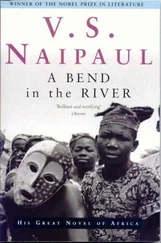V. Naipaul - Guerrillas
Здесь есть возможность читать онлайн «V. Naipaul - Guerrillas» весь текст электронной книги совершенно бесплатно (целиком полную версию без сокращений). В некоторых случаях можно слушать аудио, скачать через торрент в формате fb2 и присутствует краткое содержание. Год выпуска: 1990, ISBN: 1990, Издательство: Vintage, Жанр: Современная проза, на английском языке. Описание произведения, (предисловие) а так же отзывы посетителей доступны на портале библиотеки ЛибКат.
- Название:Guerrillas
- Автор:
- Издательство:Vintage
- Жанр:
- Год:1990
- ISBN:978-0679731740
- Рейтинг книги:5 / 5. Голосов: 1
-
Избранное:Добавить в избранное
- Отзывы:
-
Ваша оценка:
- 100
- 1
- 2
- 3
- 4
- 5
Guerrillas: краткое содержание, описание и аннотация
Предлагаем к чтению аннотацию, описание, краткое содержание или предисловие (зависит от того, что написал сам автор книги «Guerrillas»). Если вы не нашли необходимую информацию о книге — напишите в комментариях, мы постараемся отыскать её.
Guerrillas — читать онлайн бесплатно полную книгу (весь текст) целиком
Ниже представлен текст книги, разбитый по страницам. Система сохранения места последней прочитанной страницы, позволяет с удобством читать онлайн бесплатно книгу «Guerrillas», без необходимости каждый раз заново искать на чём Вы остановились. Поставьте закладку, и сможете в любой момент перейти на страницу, на которой закончили чтение.
Интервал:
Закладка:
There were perhaps half a dozen occasions on which he might have withdrawn and returned to the life that had been marked out for him. He needn’t have been tortured in South Africa; he needn’t have written his book; he needn’t have taken the job with Sablich’s; having taken the job, he needn’t have become associated with Thrushcross Grange and Jimmy Ahmed. Responsibility; inertia, perhaps; perhaps, too, some little optimistic spasm, some feeling that out of this particular decision some good would come, some good that would finally release him and enable him to return to his old life. Yet each decision had taken him further away from what he saw as his real life, and had left him, here, at forty-five, quite adrift. And he was a clear-sighted man, even cynical. His responses to people and situations were immediate; but to act he had often to ignore what he had perceived. He said, “You have to work with what is there.” Every decision he had made had been made after he had disregarded some element of the truth.
Everything that was to be known about Jane was clear at their first meeting. He had picked up all the clues; but their relationship was based on his ignoring these clues.
She was at the time doing the publicity for the firm that was publishing his book. He was still new to England, still amazed, after Africa, at the quickness of shop assistants, taxi drivers, telephone operators, secretaries. Jane, on the telephone, inviting him to lunch to discuss what might be done for his book, had been charming and persuasive; and he, abashed by what he thought to be the ritual of publication, had agreed. He had expected someone professional; but when he arrived at the publisher’s office the woman at the desk could get no reply from Jane’s extension; and he had sat for fifteen minutes or so in the waiting room, looking through the publisher’s catalogue, and considering a bronze-colored statuette of a slender, lightly draped woman raising an empty basket or bowl above her head, before Jane had appeared, coming in, to his surprise, from the street. She had been out shopping; she had forgotten the lunch.
It turned out that she was new to the job, which she said was “awful”; and, in half apology, she invited him to share her amusement at the awfulness of the job and her inexpertness at it. She didn’t quite know what she had to do, she said; but then she suggested that it didn’t matter, because it was such a “ghastly” firm anyway.
Roche was modest about his book; but he couldn’t dismiss these words about the firm simply as the turns of speech of an idle woman doing a job unseriously. The words were spoken with too much conviction, the irritation seemed too deep. So he had pressed her; he had asked her why the firm was ghastly. She couldn’t say; she had nothing to say. And she put an end to the subject of the firm, and to that particular mood of petulance, by smiling, going big-eyed, flushed and coy. He had been taken: that smile of complicity, after the display of the passionate nature.
He was not less taken when, switching from charm and girlish incompetence, she had attempted, big eyes going moist, to talk about his book. It was immediately clear that she did not know his book; it was also clear that she had her own idea of the kind of book he had written. And she was anxious to put herself on the side of this imaginary author. She said: “The colonial police are terrible.” He was struck by this sentence. It was at once glib and spoken with conviction, as though it issued out of a great store of knowledge on the subject. The anachronism—“the colonial police”—was not deliberate. To Roche the words suggested less a reading of history than a secondhand intimacy with old events: old conversations overheard, someone else’s experience — these things just remembered, a reaction suddenly summoned up.
The innocence was startling — the newspapers had campaigned in vain, he had written his book in vain — but the passion stood out the more against this innocence, against this impression she created, already, of busyness and private harassment (that shopping before lunch, forgetting the lunch she had been so eager to arrange, her swift changes of mood, the busyness that apparently left her no time for the newspapers), the harassment that was no doubt responsible for those impatient gestures: flinging down her gloves on the restaurant table with a flick of the wrist, as though she were swatting a fly, or like an exhibitionist cardplayer playing a trump card.
He didn’t set her right about the colonial police or about the book he had written. What he had written about was too close to him; and she knew so little. Besides, his political attitudes were complicated; the writing of the book had shown him that they were more complicated than he had realized. The book slightly embarrassed him; he knew it to be diffuse and ambiguous, even after the publisher’s editing; he hadn’t been able, in spite of re-writings, to overcome his instinct to muffle the personal drama of arrest, torture, imprisonment, and release.
Unwilling to explain himself, he allowed her to attribute to him comprehensive revolutionary views about Africa and race, a vision of one particular order about to be swept away. He didn’t object; but when he didn’t give the confirmation she was expecting she abandoned that large view and spoke instead, as to one who would be sympathetic, of the West Indian bus conductors in London, who were efficient and good-humored and yet were subjected to much racial abuse.
Jane said she had recently walked out of the house of a friend who had begun to say harsh things about “immigrants.” Roche could see her walking out of the house. He could see her making some abrupt gesture, sitting forward perhaps, and then, with this physical movement, finding herself committed to the whole action: picking up lighter, bag, gloves, getting into coat — swift, large gestures, which he played with in his mind’s eye and found attractive. But he doubted whether she had left the friend’s house solely on account of the bus conductors; he doubted whether she had left the house at all. And though Jane said, “Nothing would ever induce me to talk to her again,” he doubted whether there had been any serious breach.
Everything about Jane was simple, exaggerated and, oddly for a woman of twenty-nine, schoolgirlish. Of the simplicity of her views and her girlishness she seemed unaware; this absence of doubt, which was like an absence of self-knowledge, made her forceful and gave a certain solidity to her presence. She was not someone he wished to argue with or put right; he noted only, at this lunch, that she was flinging out what she clearly thought of as violent views for his approval and admiration. And this was unexpected and touching.
So the lunch, which she had arranged to talk about his book, turned into a display of her attitudes. She became the doer, the seeker; he became her audience. From time to time she threw some tribute at him for his book, the life he had led, the dangers she imagined he had been through; but she always returned to England, herself, and the attitudes of her class, about which she seemed anxious to instruct Roche. The words “colonial police” had suggested someone for whom the organization of the world was still simple, who still lived in a vanished age or within the assumptions of a vanished age; her critical obsession with England and her class showed her still to think that England was of paramount importance in the world.
They walked back to the office after their lunch; and there in her little room he saw her in her role as executive. Whereas, at the beginning, she had invited him to share her amusement at her incompetence, now she invited him to share the irritations of her job. She was sharp on the telephone with some man; when she put the telephone down she said to Roche, her face flushed, her eyes bright with temper, “What on earth do you expect from a man who has to bow and scrape all day long to make a living?” So carried away was he by her that he accepted her behavior on the telephone and her explanation afterward as logical; only later did he see the contradiction.
Читать дальшеИнтервал:
Закладка:
Похожие книги на «Guerrillas»
Представляем Вашему вниманию похожие книги на «Guerrillas» списком для выбора. Мы отобрали схожую по названию и смыслу литературу в надежде предоставить читателям больше вариантов отыскать новые, интересные, ещё непрочитанные произведения.
Обсуждение, отзывы о книге «Guerrillas» и просто собственные мнения читателей. Оставьте ваши комментарии, напишите, что Вы думаете о произведении, его смысле или главных героях. Укажите что конкретно понравилось, а что нет, и почему Вы так считаете.












